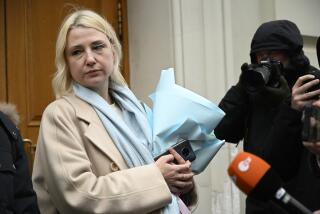Reformers Gain in Soviet Voting; Sakharov Nominated
- Share via
MOSCOW — Ardent reformers, including some longtime political dissidents, have won seats in the Soviet Union’s new national assembly, officials said Monday, announcing the results of runoff elections.
In addition, nuclear physicist and human rights activist Andrei D. Sakharov was among 28 members of the Academy of Sciences nominated Monday to run for 12 unfilled seats allocated to the academy in the new assembly, the Congress of People’s Deputies. The 28 nominees were chosen from among 168 contenders by 37 members of the academy’s presidium.
One of the most prominent dissidents to win a seat in Sunday’s election was Roy A. Medvedev, a Marxist historian expelled from the Communist Party for his attacks on Stalinism. Voters in a Moscow constituency gave him victory in the runoff, rehabilitating him more fully after 20 years in the political wilderness than any party action could.
Historian Charged Smear
Other prominent reformers elected from Moscow included historian Sergei Stankevich, who had alleged that the official Soviet press was trying to smear him by calling him a Zionist and a spy; Yuri Chernichenko, a prominent journalist and television commentator, and Yuri Ryzhov, the highly regarded director of the Moscow Aviation Institute.
In the Soviet Baltic republic of Lithuania, candidates from the Movement for Perestroika, which is known as Sajudis there, won five of the eight seats at stake, but themovement’s secretary general, Virgiljus Cepaitis, lost his own race in Vilnius, the capital. Sajudis now has 35 of Lithuania’s 42 seats in the new parliament.
For Sakharov, who spent nearly seven years in internal exile under the late President Leonid I. Brezhnev, his nomination was a vindication of both his longtime advocacy of human rights despite the government’s displeasure and of his insistence on fresh elections within the Academy of Sciences.
Candidacies Vetoed
Although Sakharov and most of the other pro-reform academics enjoyed widespread support, the academy’s leadership had vetoed their candidacies in January, provoking street demonstrations and other protests and finally leading to an unprecedented revolt within the academy that forced a new election there as scientists refused to vote for many of the officially approved candidates.
Since only eight of the academy’s alloted 20 seats were filled during the initial voting, a new round of nominations and elections was ordered. The second full round of voting on the new nominees is scheduled for next month at the academy.
The academy members nominated Monday included Roald Sagdeyev, the leading Soviet space specialist; Georgy A. Arbatov, director of the U.S.A. and Canada Institute, and Nikolai Shmelyov, a radical economist whose ideas have had a major impact on party and government policies.
Additional elections are planned for the middle of May to choose deputies for the 199 constituencies where there was only a single candidate and he or she failed to win a majority of the votes cast. A majority of voters had scratched out their names on the ballots.
Elections for the entire Congress of People’s Deputies are likely to be completed in a month, and its 2,250 members will then meet to elect the Supreme Soviet, a full-time parliament under an executive presidency.
A third of the deputies are to come from constituencies based on one person, one vote; a third are coming from constituencies based on ethnic representation, and the final third are coming from “public organizations,” ranging from the Communist Party and Communist Youth League to the Academy of Sciences, a temperance society and a national stamp collectors group.
More to Read
Sign up for Essential California
The most important California stories and recommendations in your inbox every morning.
You may occasionally receive promotional content from the Los Angeles Times.













